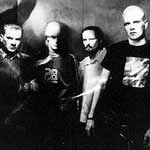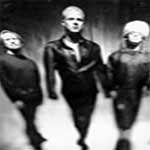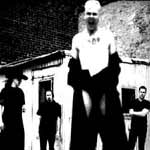| Welcome to the LOUDEST DOT COM ON THE PLANET! | |
 |

|
| Welcome to the LOUDEST DOT COM ON THE PLANET! | |
 |

|
Gravity Kills: Superstarved for Success By Jeff Kerby, Contributor Monday, April 1, 2002 @ 10:36 PM
 KNAC.COM: How would you characterize your band’s reception on the Sevendust tour given that it has been a while since the last album?
KNAC.COM: How would you characterize your band’s reception on the Sevendust tour given that it has been a while since the last album? DUDENHOEFFER: The tour was great. It was good for us to get in front of another crowd and start to develop a new fan base. KNAC.COM: What would you say was the biggest difference was between a Sevendust crowd and a Gravity Kills crowd? DUDENHOEFFER: I think the Sevendust crowd right now doesn’t really know who the hell we are. They’re learning. We came out in ’96, and we still have our fan base from back then, but I don’t think that fans of our band necessarily became Sevendust fans, so we had to win some converts out of the Sevendust fan base. I think we achieved that. There were good shows, and we had our usual mosh pits and crowds. KNAC.COM: It would seem that Sevendust audience might tend to be a little easier to play for as opposed to… Slayer fans or something like that. DUDENHOEFFER: It was still fairly hit or miss for the most part, I think. There were twenty-five shows, and they were all good, I’d say, except maybe three shows where the crowd just didn’t care who the hell we were. I don’t think it was so much that they didn’t like us as much as it just that we weren’t Sevendust. KNAC.COM: How difficult was the transition to Sanctuary Records? I understand that it was a fairly traumatic ordeal for you. DUDENHOEFFER: It was. That’s actually what the new record, Superstarved was about. It was about that transition and that phase that we were going through. We’d meet at the studio every day not knowing if we were still going to be a band the next day. Our bank accounts were dwindling, and we asked to get out of our deal with TVT. They let us, which is something they didn’t have to do, so that was cool of them. But, be careful what you wish for because we spent the next two years looking for a new home. KNAC.COM: What was the chief reason you were dissatisfied over at TVT? On the outside it looked like you sold quite a few records, why would you want to leave? DUDENHOEFFER: I think it had gotten to the point where we felt that they had lost interest in Gravity Kills and there was no one there to champion the band. The guy who had signed us to the label had left to go work with another label, and that was after our first record. So at that point, our A&R guy became the president of the label. Well, he’s got so much stuff going on -- I think he just lost interest in us. Gravity Kills got lost in the shuffle. We were turning in songs for the new record without any feedback at all. They wouldn’t say whether they liked the stuff or not. So we were basically sitting around doing nothing. We finally requested to be let out of the deal and it was cool. It was the best for both of us. I don’t think they knew what to do with us anyway and now, having signed with Sanctuary, it’s been good for us because they are a non-A&R based label -- at least in regard to us. They let us make the record we wanted to make, and we turned it in, and they said it was great. They didn’t try to meddle in our artistic creation at all.  KNAC.COM: There’s a lot of bands that have said that. Sanctuary has been really successful in signing many prominent metal acts…
KNAC.COM: There’s a lot of bands that have said that. Sanctuary has been really successful in signing many prominent metal acts… DUDENHOEFFER: Yeah, they basically let the artist do what they want to do. KNAC.COM: Right, so how do you think you guys fit in with their current roster since you aren’t like say, a Halford or a Megadeth who are established, traditional metal acts? Obviously, those are groups whose fan bases are quite a bit older than yours would be. DUDENHOEFFER: I think they were looking for a band that might put them a little more on the map in a commercial sense. They may have been looking for a band who could have success at radio in today’s market. Now they’ve got us, Pitchshifter and Ministry. They’re really getting quite a roster. I think they wanted us to be an addition that wasn’t a twenty-year-old metal band. KNAC.COM: Would you say that every song on the new album, Superstarved, is about that experience of changing labels and the collective adversity that went along with it? DUDENHOEFFER: Yeah, almost every single song on that record we have strong emotional ties to because of what we were going through. The first single, “One Thing,” is about meeting down at the studio every day just waiting for that phone call -- that one bit of good news -- about anything. The song “Fifteen Minutes” is about sitting at home about watching say, MTV, realizing that’s where we were, but realizing we’re not there now. That’s where we want to go back. We want to be there again.
DUDENHOEFFER: Absolutely you want to sell records. The people who tell that to you are lying. Anyone who is in this business wants to sell records. Otherwise, they just make records in their basement and that’s that. Obviously, we still write, especially on this record, we wrote music for us because we didn’t know if anyone was ever going to be hearing these songs. We didn’t have a label to please, so we were just basically trying to please each other and write music that we liked. Of course you hope that a great number of people will want to share that with you. The whole idea is to get up on the stage in front of a large crowd and experience the music together. And we wouldn’t be in this business otherwise. KNAC.COM: Like you said, you are a band that was on MTV, and you sold quite a few albums. How does that translate into your personal finances? Is the money rolling in? Was it at one time? DUDENHOEFFER: Yeah, well, we have sold over a one million records worldwide --everything combined. Still, there was a time not that long ago where we were just sitting at home and weren’t able to pay the electric bill at the studio one day, so they came down and shut off the power. KNAC.COM: What is it that like after you’ve been on TV and tasted some of what stardom has to offer? After all, being on TV in the minds of many equates being a star, and then you have to deal with someone cutting your electricity off. Is it strange to make that transition? It’s got to be at least a little weird. DUDENHOEFFER: It’s very weird. People want to believe the fantasy, five cars and a mansion. It’s just like that Cypress Hill song, you know, “I want to be a rock superstar.” KNAC.COM: Yep, ya gots ta live large… DUDENHOEFFER: It’s not all it’s cracked up to be. Mostly, all we want to do is sell enough records to be able to keep doing it. Hopefully, this record will be successful enough that the label will come back and say that they want us to make another one so that we get to be in this business for a few more years. It’s what we enjoy doing -- making records. KNAC.COM: It’s got to be difficult to plan in the long term either personally or professionally when that’s the case. I mean, you actually had your drummer depart to be an architect. DUDENHOEFFER: Yeah. KNAC.COM: How much of that was attributable to the financial situation? DUDENHOEFFER: I would say that definitely had to be part of his decision because he and his wife had just had a child, a girl. They just had a second a couple of weeks ago. KNAC.COM: So he definitely needed some money coming in… DUDENHOEFFER: Yeah, I think his decision had something to do with that. Like, “We don’t know where the band is going, there’s no money coming in, and I just had a kid.” So, he decided to bail and go back into architecture, and he’s doing well. KNAC.COM: Was that kind of a slap of reality for you? You know, kind of like one down…  DUDENHOEFFER: We all went through that thought process at one time or another, in the making of Superstarved. At one time or another each of us came down and said, “I dunno guys. I don’t know if I can stick this out.” Then, inevitably something would happen. A check would come in or something. We would loan money to each other and back again -- anything to help each other get through it.
DUDENHOEFFER: We all went through that thought process at one time or another, in the making of Superstarved. At one time or another each of us came down and said, “I dunno guys. I don’t know if I can stick this out.” Then, inevitably something would happen. A check would come in or something. We would loan money to each other and back again -- anything to help each other get through it. KNAC.COM: Which made you stronger as a band as far as relationships… DUDENHOEFFER: Definitely. We went through this together, had to stand up for each other and hold each other up at times. We each had to take turns being the leader during this record and keep our heads up. As much as we were going through this bad time, and as much as this record is about that, in every song there’s that ray of hope, that glimmer of what we’re looking for. So, it’s not a record saying, “Oh, poor us” for being in the situation we were in, you know. It was more of a declaration of shit we were in, where we wanted to go and what we wanted to be. So it’s not a “poor us” record, it was a… KNAC.COM: Reality record? DUDENHOEFFER: Exactly. KNAC.COM: You guys have contributed to various soundtracks -- how do you choose which ones you will be a part of? Is it primarily a business decision or do you actually have to kind of like the movie to do it? DUDENHOEFFER: You hope that it’s something cool, but what we’ve learned in this business is exposure is good no matter what. So, typically, unless we think it’s just something God awful that we don’t want to be associated with, we usually say yes when approached to do something like that. And I think all bands, nowadays, do just say yeah because it’s good exposure and whether the movie just sucks or blows, it has nothing to do with the soundtrack. There have been plenty of great movies with shitty soundtracks and vice versa. You know the Escape from LA soundtrack? I think the soundtrack is ok, but the movie was horrible. KNAC.COM: It was a disappointment, wasn’t it? I thought the first one was about a hundred times better. DUDENHOEFFER: Yeah, we were all big fans of Escape from New York and thought this would be a cool project to be associated with -- it turns out it was one of the worst. KNAC.COM: Did you even get to see the movie before you made the song? DUDENHOEFFER: Yeah, we got to go to the premiere for the movie. It was funny because Kurt Russell was there with Goldie Hawn, and they were like ten rows in front of us. Anyway, one of the actresses in the movie, Valerie Agolino, her character gets killed in the movie so after that scene was over, her and her date just got up and left. They just walked out of the premiere. She was like, “My character has been killed off, I think I can go now.” KNAC.COM: She must have known about how good the rest of the film was. DUDENHOEFFER: Yeah. KNAC.COM: You guys have toured in quite a few countries, which of them do you have a particular affinity for? DUDENHOEFFER: When we played in Great Britain, we played in London, and the crowds were great. We even did a couple of shows there that were headline shows and small clubs. The crowds of our own were great there. Spain crowds were incredible and also the Scandinavian countries. Sweden, Finland and Norway in particular just went nuts for us. We couldn’t believe it. KNAC.COM: Were they really familiar with the material or just crazy or…?  DUDENHOEFFER: Just a great response onstage that you’re looking for whether they’re singing along or jumping up and down, clapping their hands, smiling, moshing, crowd surfing, stage diving -- everything. I didn’t really expect that, but it was very cool. A lot of places we thought we’d do well, like Germany, for instance, couldn’t have cared less. That’s strange because I think we even had some songs chart over there.
DUDENHOEFFER: Just a great response onstage that you’re looking for whether they’re singing along or jumping up and down, clapping their hands, smiling, moshing, crowd surfing, stage diving -- everything. I didn’t really expect that, but it was very cool. A lot of places we thought we’d do well, like Germany, for instance, couldn’t have cared less. That’s strange because I think we even had some songs chart over there. KNAC.COM: Would you say that traveling might be the best thing that has come from being in Gravity Kills? DUDENHOEFFER: Yeah, for life experience, I certainly never would have got to travel to the extent that I have if it wasn’t for being in this band, and it’s afforded me the opportunity to go to Europe and get about two and a half months over there. Pretty much all of Western Europe and Scandinavia, we did. I think we hit about thirteen or fourteen countries, and we did manage to take time out during the day to go do some sight seeing and exploring and stuff like that. It’s cool being here in the states -- you wake up in a different city every day. KNAC.COM: Yeah, but do you get to actually see any of them? DUDENHOEFFER: This tour we didn’t because we pretty much had press all day, everyday. We did press from the time we got up in the morning. But, when we do get a day off, we do try to get around and go explore. And almost all the cities, by now, in the past seven years, almost every single major city we have been able to explore at least once, but you never have as much time as you’d like. KNAC.COM: If you could experience someone else’s style or proficiency on guitar for one day, who would it be? DUDENHOEFFER: Andy Summers. That guy is far more incredible than most people even know as a guitar player. He explored all realms of playing that instrument and felt that he never really mastered it. Every guitar player can relate to that and feel that way because there’s always something new to explore, but he, probably more than any other player, explored every single area you could imagine. He’s experienced it all. As a guitar player, I really admire him a lot. KNAC.COM: That’s an interesting answer because I’m not sure that people give him the recognition he deserves because the constructs of the songs he did with the Police didn’t incorporate eight-minute lightening-quick solos. DUDENHOEFFER: I don’t have any desire to be one of the guys who plays those types of solos. Maybe it’s part of that, but another guy I admire is Elliot Easton of the Cars. Now, there was a guy who maybe wasn’t an incredible player, or maybe he was -- I don’t know, but the solos he wrote were always perfect for the song. Every solo he ever wrote was perfect for the song. You’d miss it if it wasn’t there. They were memorable solos that would stick in your head much like some of the David Gilmour solos in Pink Floyd or Angus Young’s solos in AC/DC. A lot of times you can make a fast solo work, I’ve heard Eddie Van Halen do it some of the time, but other times I’ve just heard his solos be self-indulgent too. They can work, there’s nothing against a super fast, shredding solo -- it can be cool.  KNAC.COM: Of course, The Cars and The Police were both bands who enjoyed tremendous commercial success. Given that, what would a successful run for this record be with regard to sales? I’m sure gold would be good, but platinum would be better?
KNAC.COM: Of course, The Cars and The Police were both bands who enjoyed tremendous commercial success. Given that, what would a successful run for this record be with regard to sales? I’m sure gold would be good, but platinum would be better? DUDENHOEFFER: Platinum would be better. I’d love to have that gold album to hang up on the wall and everything, but platinum would definitely be a goal to have. At that point you might even have a little financial security -- just knowing that you’d be around to make another album at least. Our accountant told us one time that you’ve got to go gold to basically break even in this business. You actually start making money when you go platinum -- I remember the whole time he was explaining this I was sitting there thinking, “Oh, shit.”
| |||||||
|
|
| Recent Features |
 |